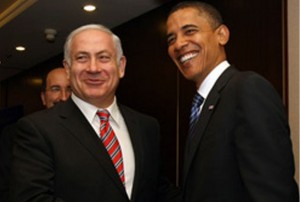
President Barack Obama has told Israeli Prime Minister Benjamin Netanyahu he will “reassess” aspects of the U.S.-Israeli relationship after the Israeli leader’s comments rejecting the two-state solution.
Obama delivered the message Thursday during a phone call to congratulate Netanyahu on his election victory this week, according to a White House official speaking on condition of anonymity.
“The president told the prime minister that we will need to reassess our options following the prime minister’s new positions and comments regarding the two-state solution,” said the official.
In the lead-up to the Tuesday election, Prime Minister Netanyahu told Israeli media he would “never” support the creation of a Palestinian state as a way to resolve the long-standing Israel-Palestinian crisis.
On Thursday, he appeared to step away from those statements, telling several U.S. media outlets he does not object to a “demilitarized Palestinian state,” but adding that is not achievable at the current time.
“I don’t want a one-state solution. I want a sustainable, peaceful two-state solution, but for that, circumstances have to change,” the Israeli leader told American news station MSNBC. “If you want to get peace, you’ve got to get the Palestinian leadership to abandon their pact with Hamas and engage in genuine negotiations with Israel.”
The White House released a statement saying that during their phone call Obama stressed to Netanyahu the “importance the United States places on our close military, intelligence, and security cooperation with Israel.”
But Obama administration officials also signaled Thursday they do not accept the prime minister’s clarifications in regards to the two-state solution, Washington’s preferred way to resolve the Middle East conflict.
State Department spokeswoman Jen Psaki said the U.S. “can’t, you know, forget” about Netanyahu’s pre-election comments.
White House spokesman Josh Earnest also said it is “pretty clear” Israel is no longer committed to a two-state solution, and warned of “consequences for actions that we take at the United Nations and other places.”
Washington, a permanent member of the U.N. Security council, has long used its veto-wielding power to shield Israel from resolutions that are critical of its actions toward the Palestinians. U.S. officials this week suggested the White House was reconsidering that diplomatic shield.
Israel’s continued settlement activity in the Palestinian territories and Netanyahu’s outspoken opposition to nuclear talks with Iran have soured Israel’s traditionally close ties with the United States.
Prime Minister Netanyahu’s conservative Likud party won a surprisingly large victory over the liberal Zionist Union party in Tuesday’s parliamentary election. Pre-election polls showed the race to be much closer.
